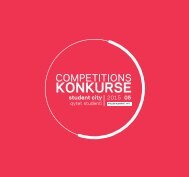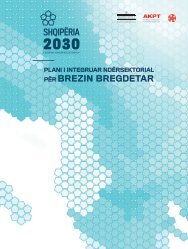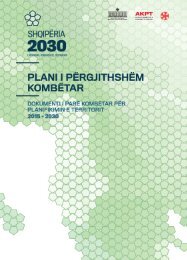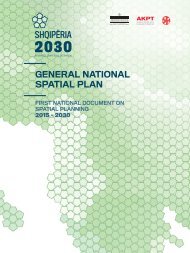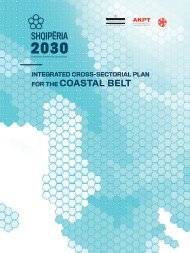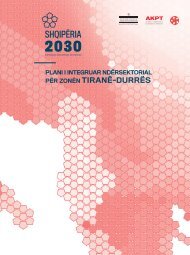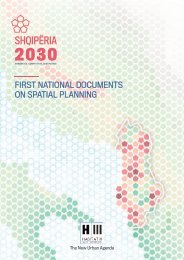Integrated Cross-Sectorial Plan of Tirana-Durres Area
The Albanian Government and the National Spatial Plan have identified the Tiranë-Durrës area, as one of the most important economic areas of the country, and of the Balkan region. To ensure a sustainable territorial and urban development of this area, the Ministry of Urban Development in cooperation with the National Territorial Planning Agency has taken the initiative to draft a Cross-sectoral Integrated Plan for the economic area Tiranë – Durrës. The metropolitan region under study includes territories administered by 5 municipalities: Tiranë, Durrës, Vorë, Shijak, Kamëz.
The Albanian Government and the National Spatial Plan have identified the Tiranë-Durrës area, as one of the most important economic areas of the country, and of the Balkan region. To ensure a sustainable territorial and urban development of this area, the Ministry of Urban Development in cooperation with the National Territorial Planning Agency has taken the initiative to draft a Cross-sectoral Integrated Plan for the economic area Tiranë – Durrës. The metropolitan region under study includes territories administered by 5 municipalities: Tiranë, Durrës, Vorë, Shijak, Kamëz.
Create successful ePaper yourself
Turn your PDF publications into a flip-book with our unique Google optimized e-Paper software.
The primary step to establish the system<br />
<strong>of</strong> private cooperatives is the integration <strong>of</strong><br />
farms with complementary functions and<br />
their organization under a board-led and<br />
regional or local agricultural fund.<br />
The aim is to determine the directions <strong>of</strong><br />
development <strong>of</strong> cooperative farms depending<br />
on local processes and products. The<br />
interaction <strong>of</strong> stakeholders can be stimulated<br />
by creating fiscal and legal incentives.<br />
Economic benefits from cooperation<br />
- More opportunities for secure markets to<br />
sell products, to ensure inputs, financing, etc.,<br />
for the farm.<br />
- Increasing and concentrating the agricultural<br />
supply to the benefit <strong>of</strong> agro-industry.<br />
- More opportunities to increase production<br />
for the market.<br />
- More market power.<br />
- More power and control on the value chain. -<br />
Coordination and cooperative behavior among<br />
stakeholders.<br />
- Reduced production costs.<br />
- Better prices for producers and consumers,<br />
etc.<br />
The municipalities and public institutions<br />
should promote the transfer <strong>of</strong> knowledge<br />
from research institutes to these structures<br />
through the development <strong>of</strong> agricultural<br />
innovation schemes and platforms. The link<br />
between public and private researchers and<br />
the rural community business will affect the<br />
reduction <strong>of</strong> product costs.<br />
Local and central governance should<br />
formulate and implement agricultural<br />
development projects and programs focused<br />
on cooperation <strong>of</strong> new generation farmers.<br />
Political benefits<br />
- Higher lobbying power.<br />
- Less opportunistic behavior among stakeholders.<br />
- More cooperation among stakeholders.<br />
- More convenience for the government.<br />
RP5- Development <strong>of</strong> the food chain<br />
The food chain consists <strong>of</strong> a series <strong>of</strong><br />
activities that start from the production to the<br />
sale <strong>of</strong> food products. The food chain includes<br />
all actors from whom it develops, farmers and<br />
companies from production to sale.<br />
The aim is to promote the primary conditions<br />
for the development <strong>of</strong> this chain, such as:<br />
• providing certified “Bio” raw products and<br />
maintaining the local characteristics for the<br />
development <strong>of</strong> food products;<br />
• enhancing environmental quality in the<br />
region;<br />
• increasing the quality <strong>of</strong> agricultural<br />
land, water network, air quality and other<br />
environmental-based factors;<br />
Table 4.19 Cooperation benefits<br />
• using natural fertilizers, and banning the<br />
use <strong>of</strong> antibiotics in living by-products.<br />
Encouraging public policies with a broad<br />
spectrum <strong>of</strong> action is a necessity in<br />
facilitating the interconnected activities <strong>of</strong> the<br />
private sector through:<br />
• The creation <strong>of</strong> a complete marketing<br />
network <strong>of</strong> agricultural and livestock<br />
products, based on two typologies:<br />
- the “farm to plate” food system focused on<br />
the development <strong>of</strong> regional and international<br />
marketing network;<br />
- the “slow-food” network in support <strong>of</strong> the<br />
regional tourism economy, focused on ‘Bio’<br />
products.<br />
139






